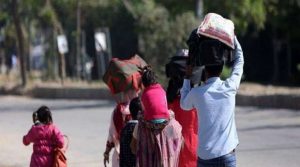Poverty And Shared Prosperity 2022: Correcting Course

The World Bank released a report titled “Poverty and Shared Prosperity 2022: Correcting Course”.
Findings of the Report:
- Global poverty reduction has been slowing down since 2015 but the Covid pandemic and the war in Ukraine have completely reversed the outcomes.
- By 2015, the global extreme-poverty rate had been cut by more than half.
- Since then, poverty reduction has slowed in tandem with subdued global economic growth.
- As such, the global goal of ending extreme poverty by 2030 would not be achieved.
- In 2020 alone, the number of people living below the extreme poverty line rose by over 70 million; the largest one-year increase since global poverty monitoring began in 1990.
- Given current trends, 574 million people—nearly 7% of the world’s population—will still be living on less than USD 2.15 a day in 2030, with most in Africa.
- The poorest people bore the steepest costs of the pandemic: Income losses averaged 4% for the poorest 40%, double the losses of the wealthiest 20% of the income distribution.
- Global inequality rose, as a result, for the first time in decades.
- Global median income declined by 4% in 2020—the first decline since measurements of median income began in 1990.




